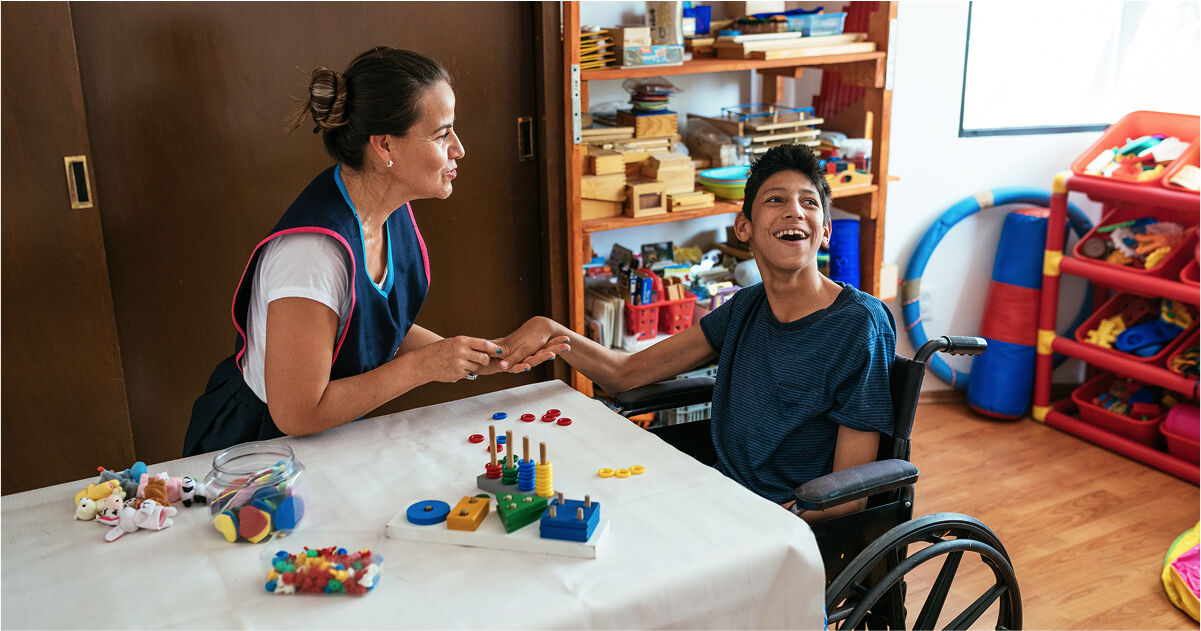
Tracing Career Transitions from Paraprofessional to Teacher: What 20 Years of Test Data Reveals
For many aspiring educators, the ParaPro Assessment is a gateway into entry-level positions supporting teaching and learning. It’s a credential that qualifies individuals to support instruction—often while gaining invaluable classroom experience as paraprofessionals. But for some, it’s also the first step toward a longer-term goal: becoming a licensed teacher.
As part of a broader initiative by the Praxis team at ETS to advance Paraprofessional development and continued learning, we’re conducting a longitudinal research study to learn from long-term testing patterns—beginning with an in-depth look at the small subset of individuals who took the ParaPro and later pursued Praxis Core or a Praxis subject-area licensure exam. Drawing on more than 20 years of historical testing records, we analyze patterns in test-taking decisions, timing and use to better understand how paraprofessionals navigate their pathway into teaching.
A Rare but Revealing Transition
Among the large population of ParaPro test-takers, only about 3% go on to take another Praxis exam. While that may seem small, this group represents a powerful lens into upward mobility within the education workforce. Their testing histories offer insight into varied role Praxis assessment serve at different entry points into teaching.
ParaPro test-takers who go on to attempt additional Praxis exams tend to follow one of two primary pathways: roughly half begin with a Praxis Core test, while the other half start with a subject-area Praxis content knowledge test. On the surface, this split might suggest two distinct goals—but a closer look at score reporting patterns tells a more nuanced story.
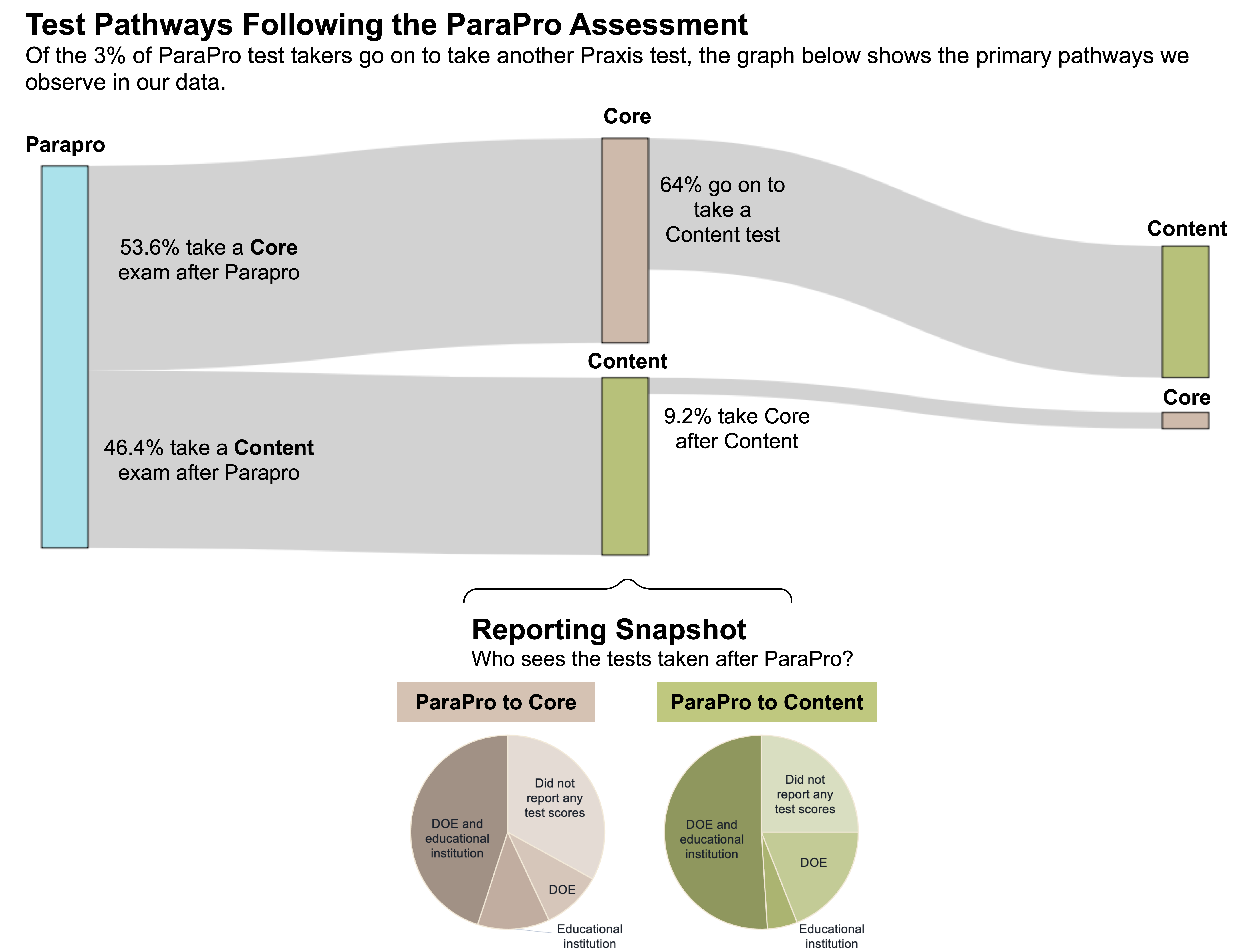
Progressing with EPP Support
In both pathways, approximately 56–57% of test-takers report scores to educator preparation programs (EPPs), indicating similar levels of engagement with EPPs regardless of whether individuals begin with Core or Content exams. These observed differences in sequencing are likely due to variation in how EPPs across the U.S. incorporate or require Praxis Core, rather than differences in candidate goals or qualifications. Timing patterns offer additional insight: individuals who take Core first typically do so about 3.5 years after ParaPro, compared to 5.1 years for those who start with Content. This 1.6-year difference aligns with the typical duration of EPP enrollment for many candidates, and may reflect the range of program structures and timelines that paraprofessionals navigate on their path toward licensure.
Direct Paths to Licensure
At the same time, both groups also include a subset of individuals who report scores only to state departments of education (DOEs) and not to EPPs (10-19%). These test-takers may be pursuing alternative certification pathways that bypass EPPs—a less frequently used, but still important route into the teaching profession.
Unreported Test Activity
Finally, a noteworthy portion of test-takers in both groups did not report tests to any institution—33% in the Core-first group and 25% in the Content-first group. These unreported scores raise important questions: Are these candidates testing for exploration, for internal readiness, or encountering barriers to progression? Understanding why some individuals take tests but do not report them could offer a valuable opportunity for targeted outreach and support—helping more paraprofessionals move from aspiration to action on their path to licensure.
Looking Ahead
For district leaders grappling with teacher shortages, paraprofessionals are often seen as a promising pipeline into the profession. Our early findings suggest that those who eventually pursue licensure tend to make the decision within the first few years of becoming a paraprofessional. This underscores the potential impact of early career support such as mentorship, preparation programs, and tuition assistance to help make this transition. Resources like ParaPathways assessment and High Leverage Practice Modules are part of ETS’s broader effort to support districts in offering early career development and professional learning opportunities for paraprofessionals on their path to teaching.
While these are still early observations, they offer a valuable glimpse into how some individuals navigate the transition from paraprofessional roles to licensed teaching. This represents only part of a much broader story. National-level data on paraprofessionals is limited, and our own dataset does not include individuals who pursue licensure in states that do not use Praxis exams. Still, within the Praxis ecosystem, these longitudinal patterns help reveal how assessments offer a unique perspective on career progression. Looking ahead, we hope to collaborate with external partners who may hold complementary data that can help us build a more complete picture of the paraprofessional-to-teacher journey.
This research is ongoing. As part of our next phase, we’re investigating performance differences between pathways and exploring whether earlier transitions predict stronger outcomes. We're also redesigning how we collect data at the point of test registration—adding questions about career goals and intentions—to deepen our understanding of where candidates are headed, not just where they are. Because understanding these journeys can help us support them more intentionally.

By The Praxis Editorial Team
Using the Tomorrow’s Teacher blog, the writers, thought leaders, and researchers who comprise the Praxis Editorial Team focus on the pedagogical issues that matter most to educators. The goal: to create and sustain a constant dialogue, and to unite the interests of all those who value teaching and learning.
More Posts

How International Teachers Are Helping Students Thrive

By Praxis Editorial Team
Published on May 30, 2025

ProEthica: Promoting Ethical Education and Teaching Excellence

By Praxis Editorial Team
Published on October 8, 2024

Fostering Teaching Excellence: A Cornerstone of Educational Success

By Praxis Editorial Team
Published on September 24, 2024

Unlocking Student Potential: How SEL Fosters Success

By Praxis Editorial Team
Published on August 27, 2024

Strategies for Student Engagement and Classroom Practice

By Praxis Editorial Team
Published on August 13, 2024
.jpg)
Top AI Tools That Benefit Teaching and Learning

By Praxis Editorial Team
Published on July 30, 2024

Mastering Teacher Skills Through Performance Tasks

By Praxis Editorial Team
Published on July 16, 2024

Embracing Technology as a Learning Partner

By Praxis Editorial Team
Published on July 2, 2024

Becoming a Teacher: A Guide for Aspiring Educators

By Praxis Editorial Team
Published on June 18, 2024

Supercharging Pedagogy: The Power of AI in Education

By Praxis Editorial Team
Published on June 5, 2024

A Critical Resource: The Importance of Literacy Skills

By Praxis Editorial Team
Published on May 21, 2024

Social Emotional Learning: Vital for Teacher Preparation

By Praxis Editorial Team
Published on May 14, 2024

Overcoming Praxis Test Challenges: Retaking and Succeeding

By Praxis Editorial Team
Published on May 7, 2024
.jpg)
Future Directions: How Praxis and Study.com Consider Educator Preparation and Support

By Praxis Editorial Team
Published on April 30, 2024
.jpg)
Unveiling Educational Impact: ETS Praxis Ventures into New Research Horizons

By Praxis Editorial Team
Published on April 23, 2024
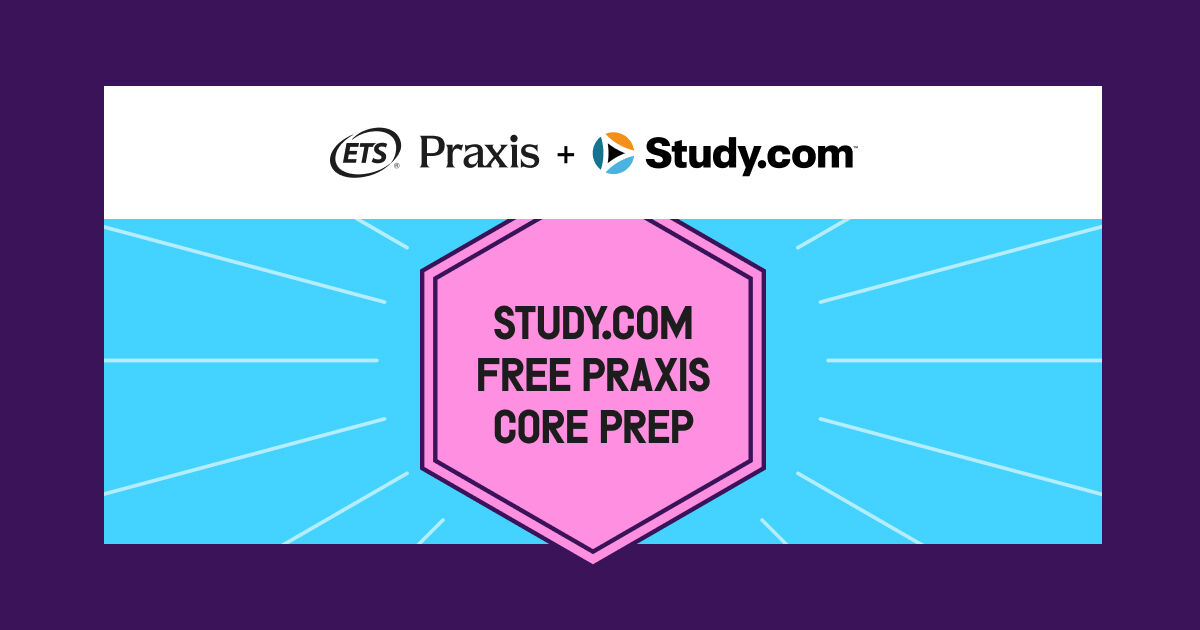
Achieving Success: Our Innovative Test Prep for Praxis Core

By Praxis Editorial Team
Published on April 15, 2024
.jpg)
Unlocking Diversity: ETS and Study.com Research Explores Keys to the Classroom

By Praxis Editorial Team
Published on April 9, 2024

Enhancing Literacy Learning: Blending Technology and Education

By Praxis Editorial Team
Published on April 2, 2024

Get Your Dream Job: Top 10 Interview Questions

By Praxis Editorial Team
Published on March 25, 2024

Making the Grade: Finding Your Ideal First Teaching Job

By Praxis Editorial Team
Published on February 27, 2024

Assessment Strategies I Wish I Knew When I Started Teaching

By Praxis Editorial Team
Published on March 12, 2024

Empowering New Teachers with Professional Development

By Praxis Editorial Team
Published on March 5, 2024

Supercharging Education with Formative Learning

By Praxis Editorial Team
Published on March 19, 2024
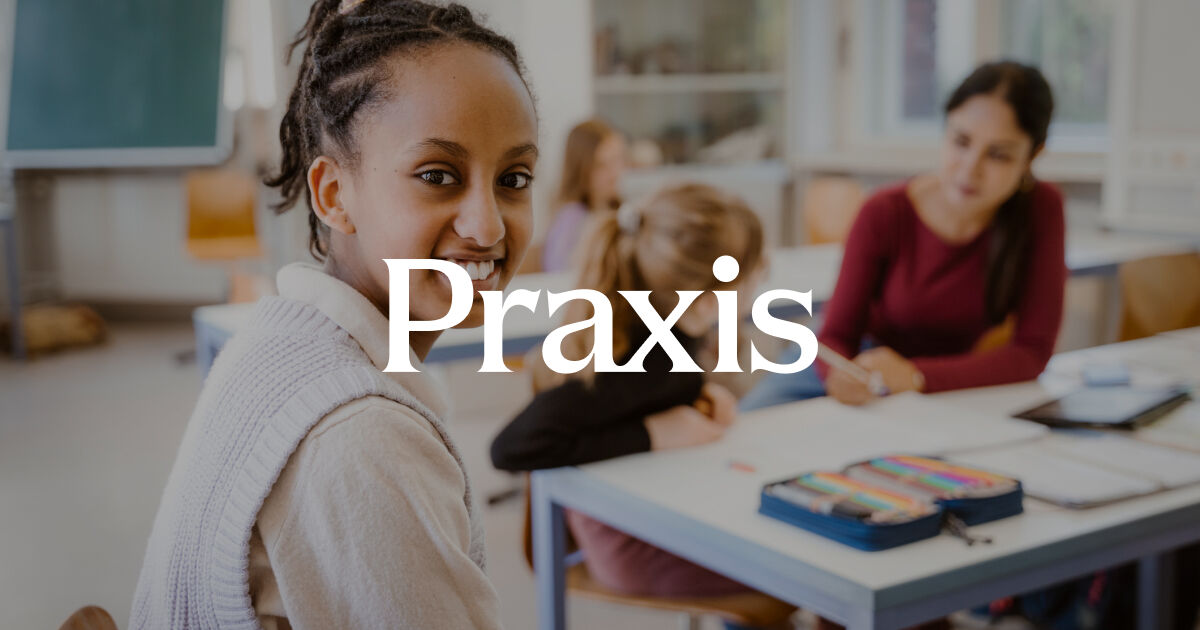
Meet Praxis: Where Education Leads the Conversation

By Praxis Editorial Team
Published on February 20, 2024

Breaking Boundaries: Praxis and Study.com Partner to Empower Educators

By Praxis Editorial Team
Published on February 20, 2024
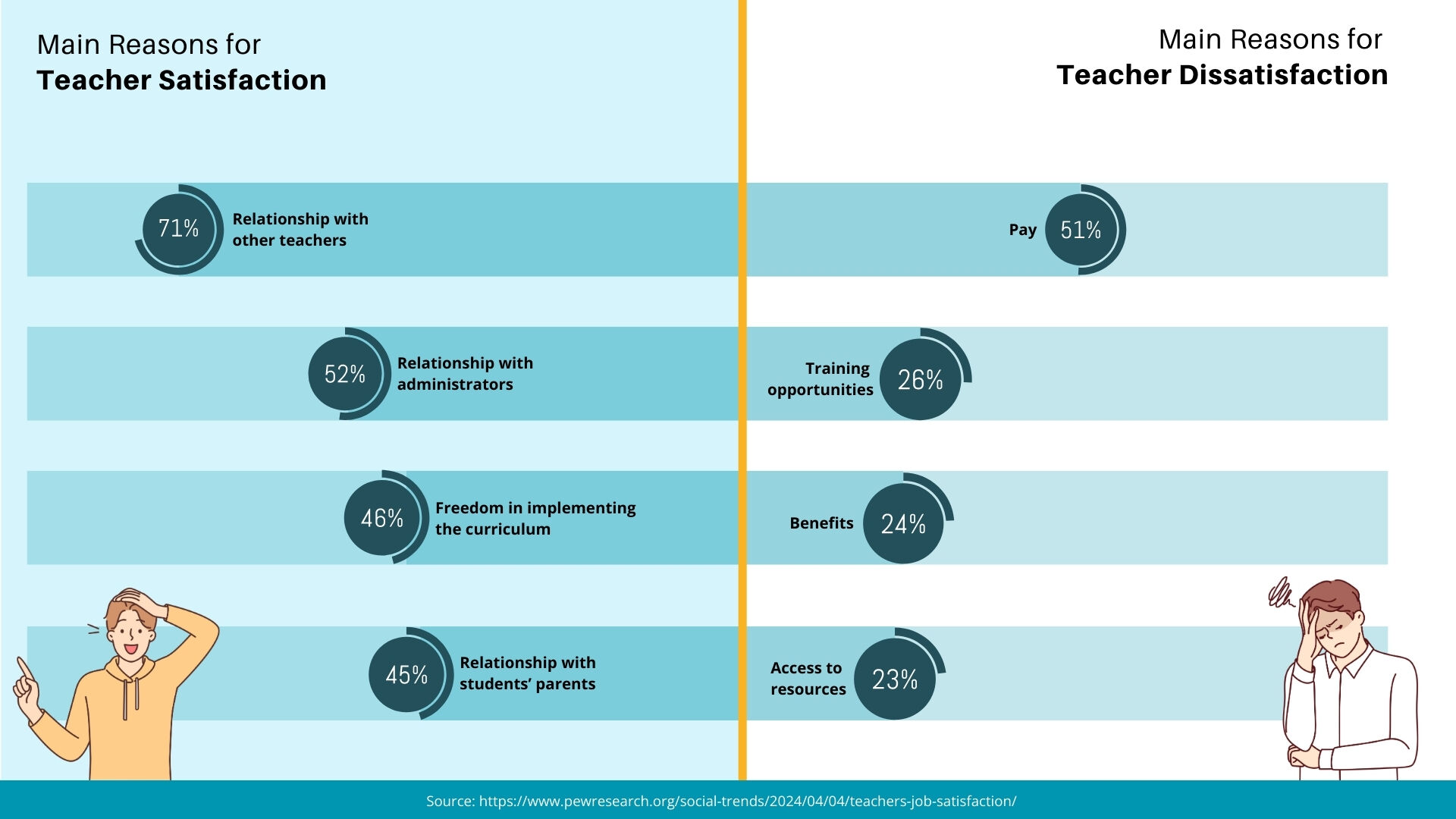
Building the Future of Teaching: Essential Investments for New Educators

By The Study.com Editorial Team
Published on September 10, 2024



